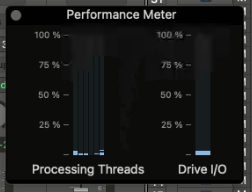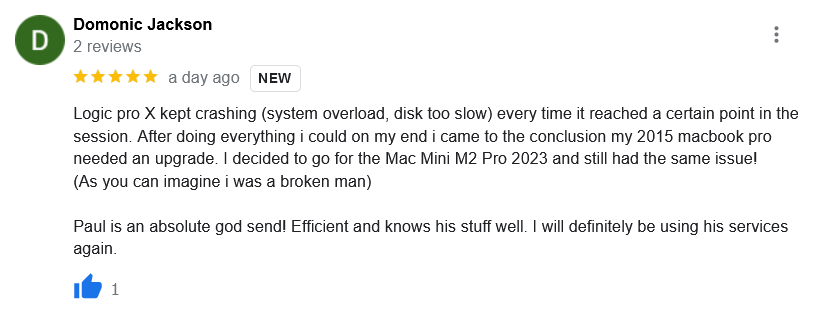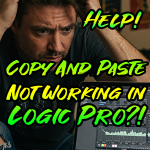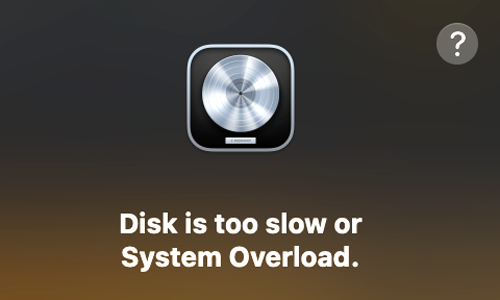Hi Paul, I hope you can help me solve an issue. I use Logic Pro and my Macbook kept crashing every time it reached a certain point in a song. It said System Overload or Disk Too Slow. I changed the buffer size and a whole a bunch of things in system preferences. After days of going back and forth I decided my 2015 Macbook needed upgrading. I’ve bought a Mac Mini M2 with 16GB of RAM but I’m still having the same problem.
Dom
I received this message from a new client by email and we arranged a time to connect the next day. Once we had the remote desktop connection sorted on his Mac, I asked him to show me the problem occurring in Logic. He opened his most recent Logic Project file and Dom showed me that every time playback reached a certain point in the track, the above error would flash up.
My initial thought was that it might be the connection to his external drive. I tested this by moving his Logic Project to the internal SSD of the Mac Mini and reopening it. We played the song through again, but it didn’t make a difference. The crash still occurred in the same place.
I asked my client how he had moved his apps and files from his old MacBook to his new Mac Mini. He told me he had used the Time-Machine backup method. This gave me another idea. It was likely old Preference files from the MacBook had been copied over to the new Mac Mini and Logic was running in an older mode.
I closed Logic and navigated to the users/client/library/preferences folder. I removed all the Logic .plist files and put them into a temporary folder on the desktop.
When I restarted Logic it was behaving as if it had been freshly installed. I had to do a couple of steps like turning off my client’s unused plugins and switch Logic back to Advanced Mode. Once Logic was ready, we opened the previously unplayable song.
The song now played through without any disk overload messages. The Performance Meter window was now showing minimal activity rather than maxing-out.

The operation had been a success. Dom was now able to take advantage of all the processing power available on his Mac Mini. I finished the session by tidying up the old preference files and deleting them from the desktop.
Dom was kind enough to write me a nice review after our session:

Logic pro X kept crashing (system overload, disk too slow) every time it reached a certain point in the session. After doing everything i could on my end i came to the conclusion my 2015 macbook pro needed an upgrade. I decided to go for the Mac Mini M2 Pro 2023 and still had the same issue! (As you can imagine i was a broken man) Paul is an absolute god send! Efficient and knows his stuff well. I will definitely be using his services again. – Domonic Jackson
About the Author

I’m the owner and lead technician for Audio Support, a small company based in London, UK that connects remotely with clients worldwide to help them with their music technology issues. I’ve run Audio Support since 2005 and in that time I’ve seen and solved thousands of recording studio problems.
Outside of Audio Support, I run music workshops at a local school, play bass in a 90s tribute function band and perform modular synth jams with friends on Twitch.
Get support for similar problems:
More Logic Pro problems solved
- No Sound in Logic Pro from Your UAD Apollo Twin? Check Your Console I/O Matrix

- UAD Apollo Twin Not Showing Up in Logic Pro? How to Troubleshoot macOS System Extensions

- Case Study: Solving Mysterious Audio Disappearing Acts in Logic Pro (The VocAlign Overlay Mystery)

- Plugin Problems Solved: Logic Pro & Zebra Crash Resolution

- Logic Pro Audio Files Missing? A Case Study in Data Loss

- Advanced Logic Pro MIDI Questions Answered

- Case Study: Solving Yamaha Montage 8 MIDI Note Issues in Logic Pro

- Copying Audio Regions Between Projects in Logic Pro 11.1.2

